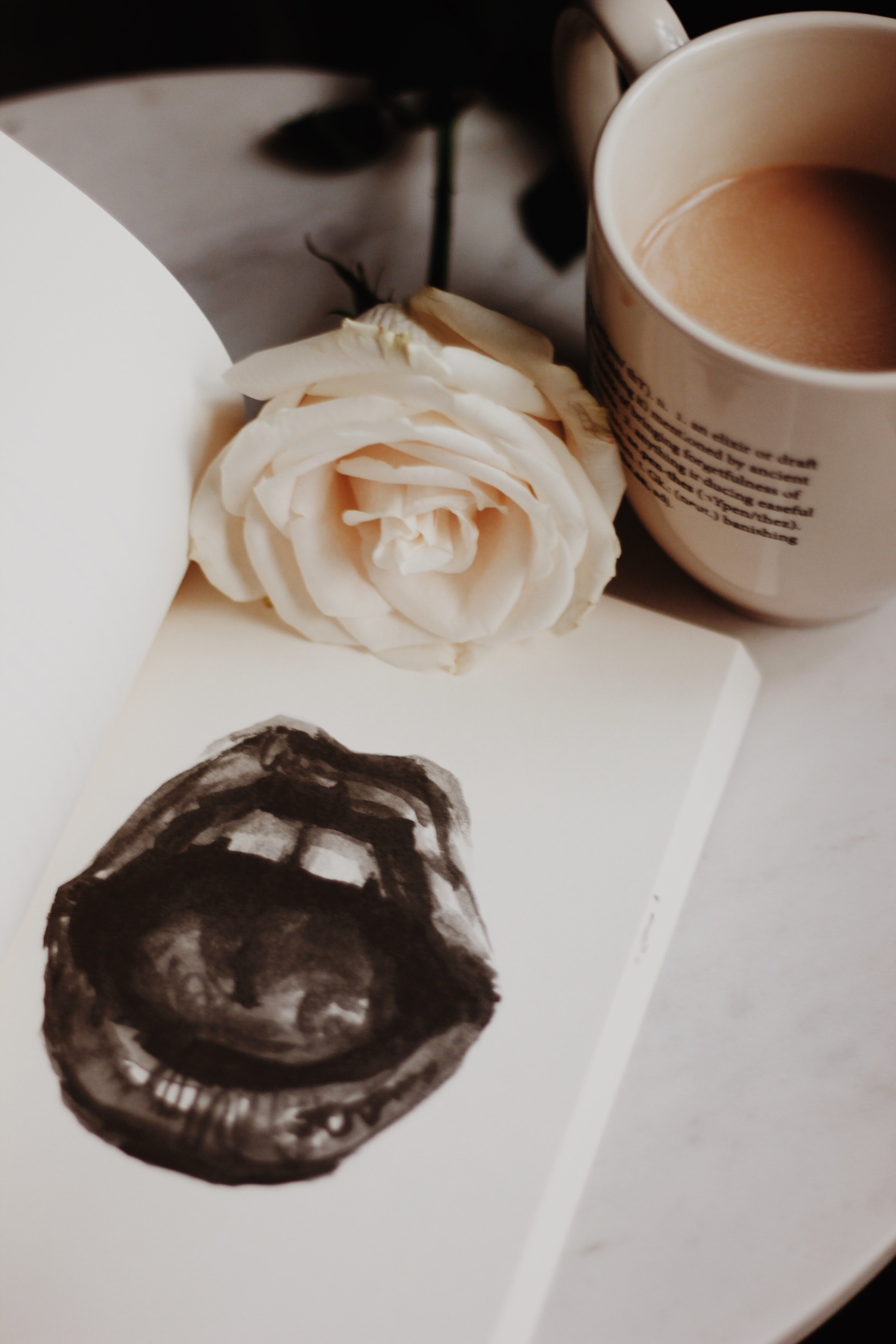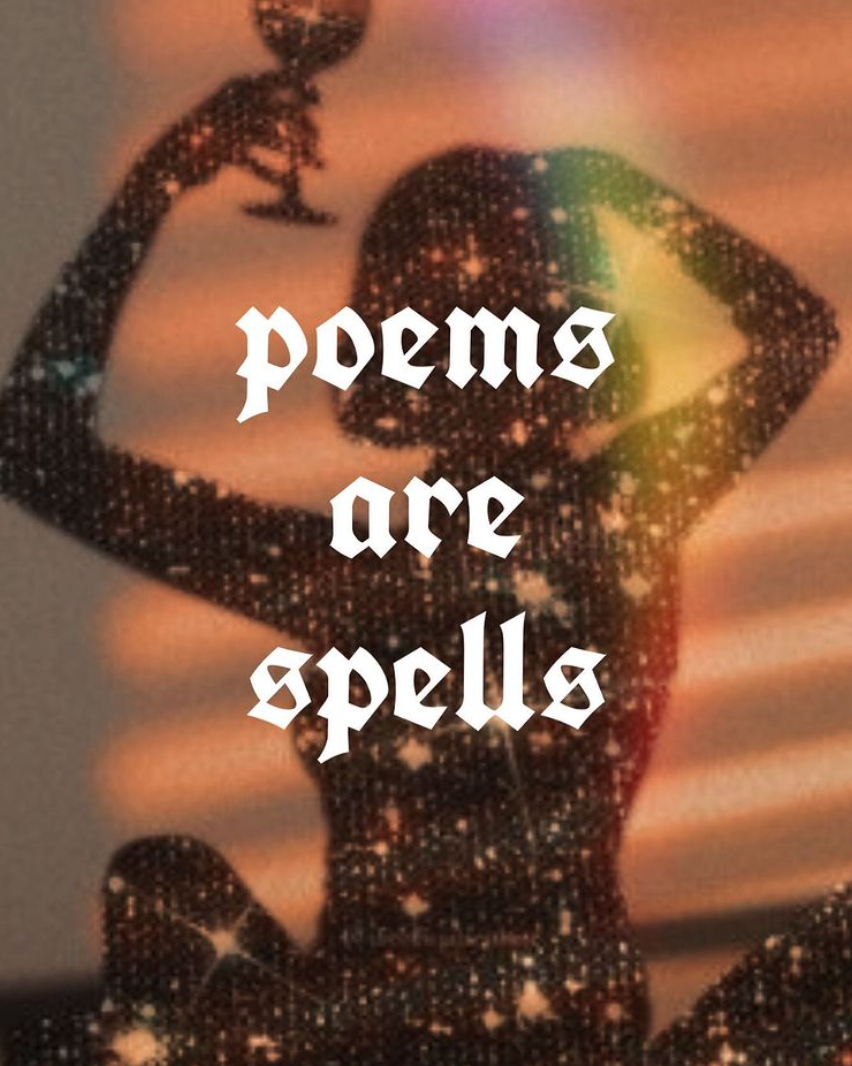BY LISA MARIE BASILE
Poetry is magic. And poems are spells. The spirituality of poetry is clear — but it’s not always obvious; like many paths and practices (especially witchcraft, folk magic, or other spiritual paths), poetry is a way toward self-reclamation, finding autonomy, understanding yourself and the world, and getting in touch with the divine, mysterious force within us — creativity.
And like a spell, a poem is born of intent and uses specific ingredients. Poetry is shadow work, a way of mining the depths. And through that act, it is a torch of illumination.
If we are the soil, the poetry is the rose that blooms. And the magic — that’s what brings it to the surface.
But why poetry? Poetry moves and slides and breaks rules; in fact, we make the rules as we write it. It defies structure, as it is a living art form, ever-changing. Its power lies in what it contains, what it doesn’t, what it gives, and what it hides in its white spaces — and it thrives in liminal spaces. It’s witchcraft.
It says, “I won’t tell you the truth, but I’ll tell you a part of it.” Poetry gives you clues. It asks you to think. It reveals according to its own rules. That’s why we always ask, “But what is it about?”
And that mystery makes it so beautiful — both to read and to write. It helps us stretch our imaginations, get out of our comfort zones, and offers a glimpse of something that one might never see or realize or pay attention to.As a poet and teacher of poetry, I think that is magical. In fact, I wrote a whole book about it: The Magical Writing Grimoire.
Like one’s magical craft, poetry asks us to return to the process. It asks us to spend time with it, nurture it, and go deeper. You are never done with learning as a practitioner of any sort. There are always more questions and always more epiphanies — and there are always more poems to download, to meditate over, and to write.
Poets are the alchemists of the page.
As witches, we carry — and work with — the great energy within us. We are always aware of, directing, or manipulating energy and emotion. This is such an incredible thing — it allows us to make the choices that enable us to be free, find relief, find purpose, find power, find clarity. To divine. To grow. Poets do this too, even if unconsciously; we bring energy and emotion to the page. We manipulate that energy and emotion — deeply aware of its powers and its meaning. How we are changing with every line we write.
We create our altars on the page, pulling together our tools and objects — words and sounds and space — to cast our spells. And just like witches, poets love our rituals: wine, a cigarette, a cleansed space to work, a quieting.
Each word is meticulously selected as an ingredient or power object. Each stanza is a breath of purpose, a standing in the crossroads. Each turn of phrase, a candle lit by the wick of another. And when read aloud, all at once, a spell cast.
How to write poetry spells & practice wordcraft
Image by Lisa Marie Basile
There are many ways to write poetry spells. The poem itself can work as a spell through its language (calling on what you want or releasing something), or through its structure and pacing (emphasizing breath work and musicality can create a prayer-like experience).
You can also create poetry spells by focusing each line or section on a specific intention, color, archetype, or goal.
By the way, don’t feel constrained or pressured by ideas of “good poetry,” or popular poetry. These are poems for you; they’re magic. They’re your essence. They’re not meant to be published or shared with the world. Write the poetry that speaks to you. In your voice. In whatever language you want to write in.
Here are some of my favorite techniques.
Writing consciously
Whether we realize it or not, when we write poetry, we are programming our creation with our intention. Like drawing a sigil, a poem is the shape and sound of our intent. Is it a poem of personal power? Is it a poem of memory? Is it a poem that recalls love? Is it a poem of reclamation? Being conscious of what you’re feeling — and programming your poem to achieve a certain goal when it’s read aloud or finished — you imbue your poem with power. It is a spell cast.
And like an incantation or a mantra, we can read a poem anytime to evoke the energy we programmed to it. It will always be there, encapsulated at the moment we created it. It can transport us, infuse us, remind us.
Write a poetry spell with a certain number of lines or stanzas
You’ll dedicate each line or stanza to a specific idea or feeling you’d like to conjure, let go of, or release. Each line, in effect, will give you the opportunity to focus your intention and energy. This is where poetry spells really get powerful since you can focus stanzas or lines on archetypes, gods, goddesses, guides, ancestral symbols, power colors, sacred sounds, or goals and conjurings.
Want to try one? This 11-line poetry spell for healing is accessible and potent.
Write automatically
On the other end of writing with conscious intention, automatic writing is a way of writing — freely, without censorship or goal — in a sort of trance state. Think of yourself as a vessel, downloading the information and translating it to the page. Writing a poem this way means writing anything that comes to mind — and then deciphering that when you’re in a more conscious state.
Write the liminal
Write a poem that speaks of the in-between, the crossroads, the liminal. What does it look at dusk? What does it feel like to be almost touched, almost loved, almost lost? How you capture what feels to straddle the liminal — in a poem?
Word Worship
A book of poetic spells, The Lost Words, aimed to reclaim and celebrate natural words that were taken out of the Oxford Junior Dictionary. These words, acorn, adder, bluebell, dandelion, fern, heron, otter, and willow were replaced with words like blog, broadband, bullet-point, cut-and-paste, and voice-mail.
What words mean something to you? What words speak to your memories and personal power? Are there words that speak to your identity, your resistance, your body, your journey? Choose five of these words and write a 5-stanza poem using each of them, or write five poems (as a set to be read aloud together) utilizing each. When you speak them aloud, you can call on these qualities.
Dream poetry
When we wake up, our minds are loose and fluid, capable of magic — still tethered to other conscious states. Once away, tap into that dream space and write a poem about your dream. Let its contradictions and messiness and weirdness soak into your poetry.
What is the dream’s message? Write that message into your poem. In this way, you are divining from the subconscious mind, mining the dreamscape, and channeling it from the ether into a physical thing to be explored and tapped into. Dedicate a whole section of your grimoire to dream poetry and you’ll watch the themes and messages unravel — allowing you to swim in a literary sea of the self.
Herbal poetics
Are you a fan of cannabis or mugwort? Both are used for spiritual purposes, opening a sort of mental portal. In a high state, write what comes to mind. Don’t bother making sense or trying to define meaning right away; just let the feelings guide you. Ride the wave of the self, and let your words slip onto paper, unregulated. Light your joint with the flame from a candle lit in your sacred space.
These poems capture the experience of liminality, highness, and the dream state. As you write, you are channeling, translating, and creating a space of sacred connection. A spell is an active, dynamic thing — one that is created as it is cast. Every time you read the poem aloud afterward, it can call on that same energy.
You can read more about weed witchcraft right here — Weed Witchcraft: A Ritual With The High Priestess of Smoke by Moxie McMurder, who writes, “Smoking the holy herb is a spiritual act, one that puts you in touch with the four elements and when practiced correctly can lift the veil reveal and nature's secrets.” Just remember to stay safe, be legal, and talk to a doctor before using any psychoactive substance.
Parts of this article were excerpted from The Magical Writing Grimoire.
—
Lisa Marie Basile (she/her) is a poet, essayist, editor, and chronic illness awareness advocate living in New York City. She's the founder and creative director of Luna Luna Magazine and its online community, and the creator of Ritual Poetica, a curiosity project dedicated to exploring the intersection of writing, creativity, healing, & sacredness.
She is the author of THE MAGICAL WRITING GRIMOIRE, LIGHT MAGIC FOR DARK TIMES, and a few poetry collections, including the recent NYMPHOLEPSY, which is excerpted in Best American Experimental Writing 2020. Her essays and other work can be found in The New York Times, Narratively, Sabat Magazine, We Are Grimoire, Witch Craft Magazine, Refinery 29, Self, Healthline, Entropy, On Loan From The Cosmos, Chakrubs, Catapult, Bust, Bustle, and more. She is also a chronic illness advocate, keeping columns at several chronic illness patient websites. She earned a Masters's degree in Writing from The New School and studied literature and psychology as an undergraduate at Pace University. You can follow her at lisamariebasile.
































